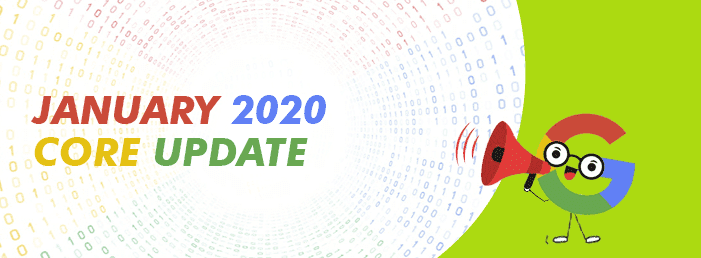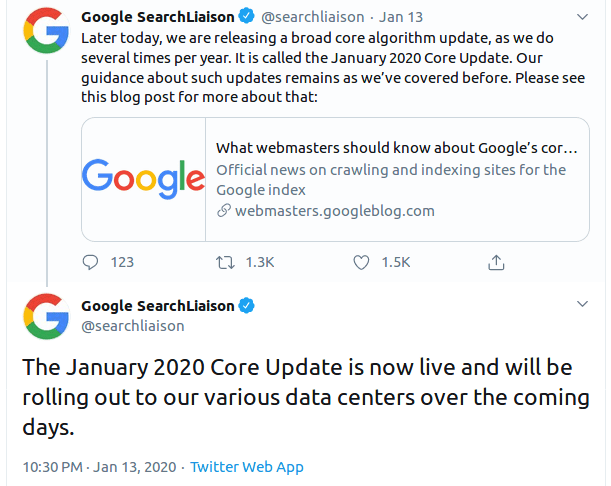
Wake-up Call for Webmasters: Google’s First Algorithm Update of 2020
On 13th January, Google announced to roll out its first Algorithm update of 2020. It is a broad core algorithm update, as mentioned by Google on its Twitter handle.

While Google rolls out several algorithm updates every year, the broad core algorithm update occurs for a few times. The update will have an impact on the websites, unlike the core update, which is, at times, overlooked due to its minimal impact.
Google claims that the Broad Core Algorithm Update will cause fluctuations in SERP, triggering an alarm for the webmasters.
That is why Google has always insisted webmasters to provide great quality content in order to avoid the effects of a Broad Core Algorithm update. The update will look for enhancing the search quality by providing better search results.
A Gist of Google Broad Core Algorithm Update:
- It is far more impactful than a daily core update.
- Webmasters can identify the fluctuation in ranking positions for global search queries.
- The update improves circumstantial results for each search query.
- As of now, there is no solution for websites which were impacted by Google update in the past.
Webmasters can only work to improve content quality.
The guidance by Google for the Broad Core Algorithm Update remains the same as the earlier core updates.
So, Google has also come up with a few instructions for webmasters to take action relating to the update.
Here’s what webmasters need to understand about the Broad Core Algorithm Update:
Since some websites may notice a significant drop or gain in rankings, the websites which have experienced a drop might be looking for solutions to get back in the game.
1. Update your content –
The core update is all about revisiting your content overall. Nevertheless, the pages which are performing better need no or minor changes, while the pages which have violated the webmaster guidelines might need rework. So, these changes will help the underperforming pages to rank better.
Here’s an example shared by Google to explain it better:
- One way to think of how a core update operates is to imagine you made a list of the top 100 movies in 2015. A few years later in 2019, you refresh the list. It’s going to naturally change. Some new and wonderful movies that never existed before will now be candidates for inclusion. You might also reassess some films and realize they deserved a higher place on the list than they had before. The list will change, and films previously higher on the list that move down aren’t bad. There are simply more deserving films that are coming before them.
2. Focus on the quality of content –
There’s nothing wrong with the content of pages whose rank drop after the core update. It’s a step for the websites to ensure they deliver the best content which algorithms look for to appreciate. The whole idea is to put efforts in the right direction. The less-performing pages need a chance to perform better by understanding that they need to do something.
Also read: Google BERT Update: Everything to Know So Far
Here are few questions categorized by Google for webmasters to ask themselves for their content:
Regarding content:
- Does the content have original information, report, research, and analysis?
- Does the content have full information related to the topic?
- Is the content insightful enough, or is it engaging or just a boring one?
- Does the headline or page title is comprehensive enough to summarize the content?
- Do you yourself would want to bookmark or share this page with others?
Expert level:
- Is the content presentation credible with defined sources, evidence, or author’s bio?
- Would you believe that the website from where you have researched your content is trustworthy or well-known?
- Is the content written by an expert of the topic?
- Is the content factual error-free?
- Is the content ell-trusted enough for issues relating to your money or life?
Look and feel of the content:
- Does the content have spelling or style errors?
- How is the content presented? Does it have a well-defined or a sluggish look?
- Is the content overloaded with ads to disturb the main portion of the content?
- Is the content mobile-friendly?
Scrutiny questions:
- Is the content valuable as compared to other pages for the same search query?
- Does the content have genuine information that is useful to the visitors, or is it just because others have posted too on the same search query to rank?
How to recover from the impact?
As the broad core updates happen every few months, if you have made improvements in your content, you might not see significant changes in your ranking unless the next broad core update is rolled out.
As Google is a search engine, it cannot understand the content as humans can. So they try to find signals to correlate how we can understand the content. For Google, how well the pages are linked to each other seems like a good signal.
So, there you have it…
If you witness a drop in the rankings, check what is ranking ahead of your content. Study that and figure out how you can provide 360-degree information on the same to make your content better than others.
Hence, you may encounter widely noticeable effects. So paying attention to your rankings in the coming days and weeks is imperative.

